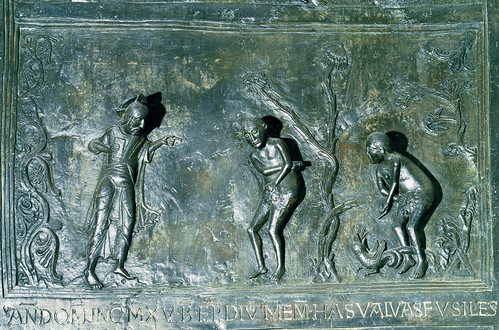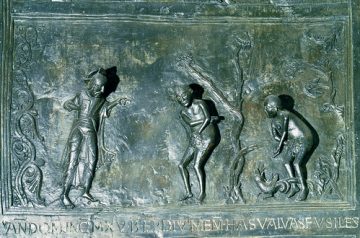Last week, I saw a performance of The Crucible, by Arthur Miller. It was a National Theatre Live stage production, broadcast from London. It was extraordinary.
I can remember seeing at least 5 different productions of this play since 1970. Even though it is set in Salem, Massachusetts during the witch trials and hysteria of that time, it has always been frighteningly similar to rhetoric and actions contemporary to each production.
This was no different.
It occurred to me, as I watched the townspeople in the play respond to the actions of some of the young girls of the town in different ways – some with recognition of normal angst and free-spirited expression, some with anxious concern and desire to understand, some with extreme reaction, condemning judgement and desperate need to control events they feared and didn’t understand – that a subtitle for the name of the play could be “The Dangers of Taking the Devil’s Name in Vain.”
The moment any of the young girls feel backed into a corner by the demands for explanation from some of the townspeople or clergy, and there is unwillingness to accept that youthful dancing or expression could be anything normal or innocent, the leader of the young group deflects by accusing the Devil of having power over them. Then the other girls are caught up in doing the same. The most extreme townspeople demand to know who helped the Devil, and the girls start to accuse townspeople of witchcraft and devil worship. Soon, the jail is full of the most stalwart, hardworking, deeply good townspeople who are soon condemned to death, even though the only thing they are guilty of is to be someone one of the girls does not like, or wants out of the way. Many are willing to lie, and confess to witchcraft in order to escape death. Those who are accused are tested in ways that provide no possible way to prove innocence. Guilt is assumed even if there is only association with someone already condemned, and if no confession is made, death is the only option.
The powerful final scene is a moving conversation between husband and wife, both condemned, and each expressing love, mercy, repentance and forgiveness to each other. The desperation to express this to each other brought on by realizing this will be their last few moments together before death separates them is tangible. The barriers between them – the anger, pride, hurt, fear, all that kept them from relishing their love for each other in earlier times – all falls away as they just want to be present to the love they want to give each other. Not even the threat of death is stronger than that love.
Even as some of the clergy and judges realize that things have gone too far, and their actions have destroyed the town, and the loudest accusers have run off, the judges are not willing to admit they might have been wrong. They cannot allow themselves to apologize, or be swayed. The only option they will allow is to try to convince those who have not yet been executed to be willing to lie and confess to witchcraft, telling them that will allow them to escape death.
Even in the awareness that people have died because of the clergy’s and judge’s own fear, and ignorance, these judges are not willing to own their responsibility. They continue to blame the Devil, and insist they cannot allow anyone to go free who does not agree to blame the Devil as well.
I don’t hear many in my time use the name of the Devil in vain like this. But it seems that many are quick to use the name of Satan in vain.
It seems more than a few are saying that if someone is not living, voting, agreeing, dressing, worshipping, loving, serving, or existing in a way one understands or is comfortable with, then they are being influenced by Satan, or making Satan happy. This is a convenient way to deflect attention or responsibility from one’s own words or actions, or rather lack of actions that are needed to contribute to a thriving community.
While I am especially concerned to hear this kind of talk from church leaders, it has never stopped occurring in political or educational groups either. As I have said often – this is not a Mormon problem, it is a human problem. And it is deadly.
I find it especially appalling that any person who confesses to follow Christ would so readily use Satan’s name in vain. But that is one of the components of our origin story, our archetype for our human journey – Adam and Eve in the Garden.
The scene is concisely depicted a bronze panel on the Bernward Baptistry doors. God is confronting Adam in the Garden, asking him who told him he could eat the fruit of the tree. Adam is pointing to Eve, Eve is pointing to the serpent.
This is the story of us. We like being in the garden where we don’t have to be responsible for decisions or actions. We just do what we are told, and we blame someone else when things don’t work out. But at some point, we are drawn towards wisdom, and complexity, and the need to grow up and be responsible for our journey, for our progression, for seeking further light and knowledge, even if things might be difficult or unpredictable or uncomfortable. We are drawn towards a deep, fulfilling, inspiring existence of ongoing growth. This is a journey of creation. Things will still go wrong, and we will still want to blame others. But growing up involves the practice of being responsible for multiplying and replenishing the life and inspiration that led us forward, that increased and deepened our breath.
In reading the Jesus chapters in the New Testament, there are some where Christ had to deal with this. Plenty of attempts by church leaders to trick Christ into admitting he was breaking the law, doing evil, following Satan, when he was actually ministering to those who had been rejected or cast out by these church leaders. Christ wasn’t much for feeding that rhetoric. He continued to devote his energy to minister to the outcast in miraculous ways.
I do want to point fingers. I do want to blame deadly harm inflicted on the innocent to those who accuse anyone who disturbs their comfortable certainty of following Satan. I see the despair of some church members, desperately wanting to belong in community with others who share the covenant to bear one another’s burdens, to mourn together and rejoice together, to take on the name of Christ and to not do so in vain. But these fellow members are turned away from full fellowship because they are accused of aligning with Satan, and those who accuse will not allow their comfort, their certainty be disturbed by the call to learn from each other, to love one another, to see each as a part of the one-ness of God.
Then the example, the presence of God in those moments of despair remind me that the finger pointing, the blame, the deflected responsibility – it will only be in vain.
When anyone promises to take on the name of Christ, but then rejects or denies existence to someone they won’t try to understand, and then connects that someone to Satan – they are also taking the name of God in vain. Denying, casting out, or refusing room to someone in need of belonging – this is the opposite of the example and teachings of Christ.
In The Crucible, it is only when the collapse of the town is inevitable, and the security and standing of the clergy and judges who caused it are threatened – only then do some of them try to admit their deadly mistake and stop the devastation. But the most powerful will not admit they were wrong, and can only offer options that do not require their repentance. In the end, all are destroyed, but some are redeemed.
The redemption comes to those who offer repentance and forgiveness, love and mercy to each other. To those who sit with each other in compassion and one-ness.
We are all on a journey. At some point, I think we will be asked to see that blaming others for our fear, discomfort and unwillingness to love is all in vain. No matter what name you invoke to do so.




6 Responses
This post is so profound and thought-provoking. Thank you for writing it.
I had just been considering writing a post about Satan and how confusing our teachings about him are. Loved this right from the title. I’ve been trying to figure out how Satan can both be the epitome of evil and also not have existed until after the need for a Savior was presented. We seem to have a fundamental misunderstanding of what precisely we mean by good and evil or Satan’s role. Not to mention the confusion surrounding the fact a disembodied spirit is cursed to a serpent like body. Unfortunately, even the spaces we are supposed to go for more learning seem to increase this confusion for me. I try to conclude that God is love and Satan is shame and all the rest of the details will get worked out. Thanks for sharing this.
Jody, thank you for this excellent post. My husband and I have had many similar discussions on “hard working” Satan. I don’t believe in a Satan who lurks behind doors, hoping to find ways to destroy us. I’ve heard more than a few people say that they don’t vocalize their plans to attend the temple because as soon as they do, Satan immediately resorts to all kinds of mischief to keep them away. I have also heard Satan credited with leading my children away from the church, manipulating someone into believing they are gay, and even “tempting us with good in order to get us in his snares.” Pointing a finger at someone’s behavior and then at Satan, instead of examining our own biases and lack of compassion, is as classic as “The Crucible” and as timeless as The Creation story. Thank you for weaving this all together in a way that I will be thinking about and discussing for a very long time.
Loved this post, Jody. I acted in The Crucible in high school and you have such great insights here.
Thank you for this. I’m going to be thinking about this for a long time.
I’ve often thought about this subject and you’ve done a beautiful job writing about it. Thanks for an insightful, thoughtful post. I really enjoyed it.